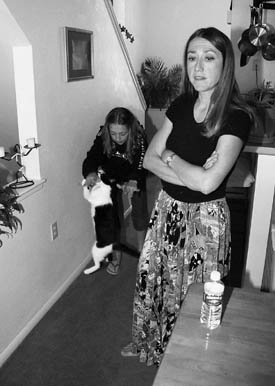|
Durango grapples with ongoing discrepancy
between work-force wages and affordable housing
by Missy Votel
photos by Todd Newcomer
Sidebar:
County, city eye regional housing authority
Sidebar:
Affordable options in Durango
 For several years, “Lisa,” now a divorcee with a college-aged
son, lived the American dream, Durango style.
For several years, “Lisa,” now a divorcee with a college-aged
son, lived the American dream, Durango style.
“That big house on the river, that
was me,” she said.
But the marriage ended, taking with it the
security she had grown to know and expect.
“What happens is, you get a divorce,
and you lose the house, and you’re on your own,” she
said.
Lisa, who works full time in a couple of
local doctors’ offices, now lives in a rented apartment
in town but is having trouble making ends meet.
“My rent is killing me,” she
said.
According to the recently formed Affordable
Housing Task Force, a loose coalition of organizations involved
in providing affordable housing in the county, Lisa is not alone.
In fact, the task force – made up of
representatives from Mercy Housing, Habitat for Humanity, Colorado
Housing Inc., Southwest Community Resources, and city and county
staff – pinpoints the most needy residents as the working
class.
“We’re doing this for the work
force of Durango,” said Mary Kennedy, a task force member
and manager of Merced de las Animas, 50 low- to medium-income
rental units in the 3700 block of West Second Ave. provided by
Mercy Housing.
“Nurses, police officers, teachers
have a hard time here,” she said. “A lot of quality
people move on because we don’t have housing for them to
afford. And that’s what the task force is trying to change.
“A lot of the work force is having
to move to Bayfield or 45 minutes away to be able to work in Durango,”
she said.
In fact, a 2001 report by Operation Healthy
Communities found that 43 percent of Durango families do not qualify
for a loan to buy a median-priced home – about $230,000
in 2001, according to the Durango Area Association of Realtors.
According to standards set by the U.S. Department of Housing and
Urban Development, housing should not cost more than 30 percent
of a household’s gross income. This means, in order to afford
a 30-year mortgage on a typical $230,000 home, assuming 10 percent
down and 6.125 percent interest, a household would have to make
about $50,310 a year. As far as rental properties go, the average
three-bedroom apartment runs about $1,100, requiring a household
income of $47,143, according to the task force. Only problem is,
the median income for Durango in 2001 was $49,900 according to
HUD, leaving a good part of the community searching for options.
 An
end to the nightmare An
end to the nightmare
Ken Bigelow, a computer network technician
at Pueblo Community College, was living in a mobile home in Oxford
with his three sons and wife. Although the Bigelows owned the
mobile, they leased the land, and when their landlord told them
he wanted the land back, they were left in a quandary.
“There’s not a lot of places
you can move an old mobile,” said Bigelow, whose wife is
unable to work because of a disability.
Fortunately, through a friend at work, Bigelow
heard about Colorado Housing’s “sweat equity”
program, whereby families can work off part of a home’s
price by helping with its construction. Colorado Housing also
offers 33-year, low-interest mortgage loans through the U.S. Department
of Agriculture to further offset costs.
“I looked into it, and we qualified,”
said Bigelow, who after a year of work, moved into his home about
a month ago. The 1,250-square-foot SkyRidge home, which is one
of six in the development, costs him about $700 a month. “I
don’t know where we would have gone without this,”
he said.
A few doors down from the Bigelows lives
Peter Talley – a teacher at Durango High School who works
with emotionally disabled kids. He moved into his Colorado Housing
home with his son and daughter almost two years ago. Before that,
he lived in Ignacio.
“I couldn’t find a place in town
to make ends meet,” said the 10-year resident. Although
originally from Albuquerque, Talley said he used to make frequent
trips to Durango as a child.
“I always wanted to live here, and
it’s been a tough go of it, but I think I finally made it,”
he said.
For people not quite ready to jump into home
ownership, finding rental housing can be equally daunting.
Kalinda Walker, a counselor at Community
Connections, lives in a rented three-bedroom townhome at Merced
with her husband, Steve, a heavy equipment operator, and her two
daughters. Walker is a lifelong resident of Durango and says she
has seen what the area has to offer on the open market and is
not impressed.
“I’ve lived here my whole life,
and I’ve lived in some pretty bad places,” she said.
“Plus, by the time you pay first, last and deposit, it costs
$2,000 to move in.
“It was a nightmare.”
Fortunately, the nightmare ended when Walker
secured a spot in Merced, which was not the first time she would
live there.
“Merced saved me one time before,”
she said. Walker said she lived there a few years before when
she found herself “in a bad situation.”
But once she got back on her feet, she moved
out, a move she soon regretted. “I was living in a place
that was too expensive and too small,” she said. “That’s
when I knew Merced was the place I was supposed to be.”
(continued...)
|

